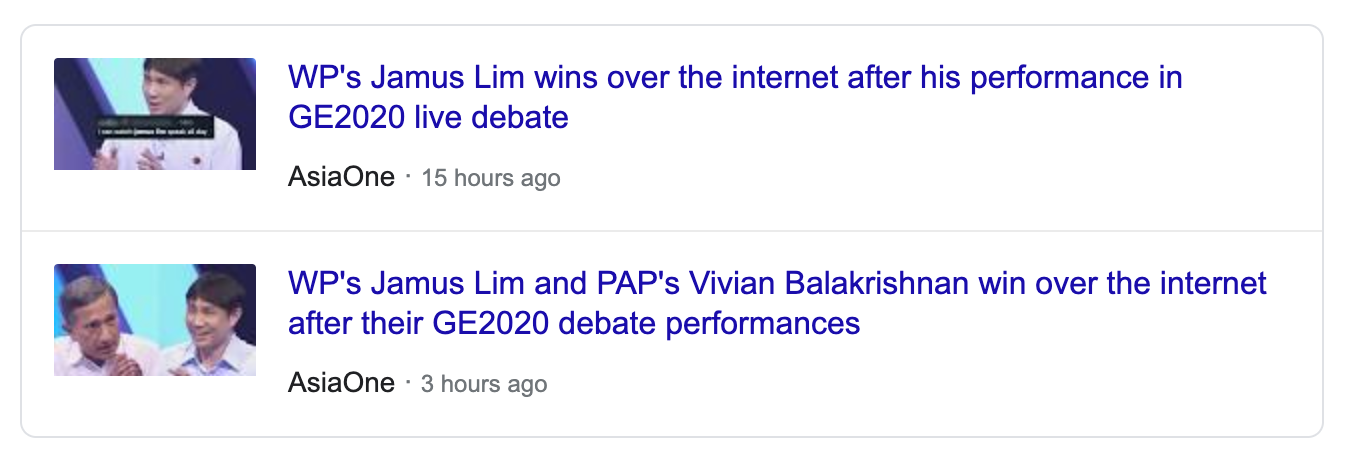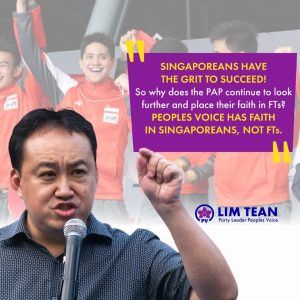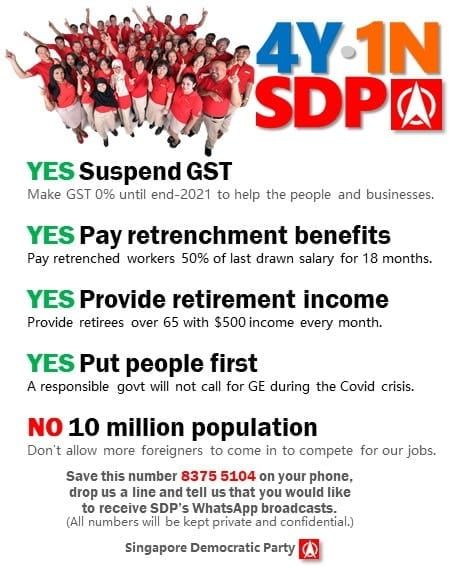Check out We, The Citizens’ spreadsheet compilation of party manifestos for this election. If you’re looking for an explainer on the election itself, New Naratif has a comic explainer for you.
Last night we had the first political debate between the People’s Action Party, Workers’ Party, Singapore Democratic Party, and Progress Singapore Party in English and Chinese (although the Workers’ Party didn’t send a representative to the Chinese debate). I haven’t watched the Chinese one, but caught most of the English debate, which focused largely, and unsurprisingly, on jobs and the economy.
I’m not going to call a winner in the debate, lest I, like AsiaOne, have to edit my headline/piece to acknowledge that there was, indeed, more than one Goodboi:

But there were some things that were raised during the debate that I’d like to zero in on. Let’s go, then…
Local versus Foreign
Both Francis Yuen of the PSP and Chee Soon Juan of the SDP opened with points about foreign PMETs (Professionals, Managers, Executives, and Technicians) at the debate last night. This isn’t anything new. The issue of immigration and foreign workers — be they blue-collar low-wage workers, or white-collar PMETs — was also prominent in the last two general elections. Looking back at my coverage of the 2015 general election, I found this piece that I’d written about immigration, foreigners, and capitalism.
Multiple opposition manifestos talk about tightening quotas for work visas like the Employment Pass, and requiring employers to provide more justification for why they’re hiring foreigners rather than local workers. It speaks to a widespread sense among Singaporeans that locals are being displaced by immigrants, and with anxiety over the recession and job losses, this sentiment is likely to be heightened.
As with everything else, Singapore’s current immigration policies should be open to critique and discussion, and alternative proposals considered.
Yet some of the rhetoric employed by opposition parties in criticising existing PAP policies veer away from policies into xenophobia. Instead of pointing to flaws in the PAP policy and ideology, they end up framing the issue as one that paints non-Singaporeans as the Other, here to steal Singaporean jobs and make our lives harder. In this narrative, it isn’t the capitalist “growth at all costs” model promoted by the ruling party that’s the problem; instead, it’s depicted almost as a sort of conspiracy between the ruling party and shady outsiders here to rob us of our rice bowls.
In this Progress Singapore Party video, for example, migrant workers are portrayed as having taken the jobs of Singaporean blue-collar workers. Collateral from other parties also tell the same story, focusing on foreigners rather than the system:


I absolutely understand the desire to revisit and review immigration policies — given the PAP dominance that allows them to pass laws and implement policies without meaningful challenge, there hasn’t been any serious, nuanced discussion on the national level about this (or most other issues, for that matter). But drawing people’s attention to foreigners, or “FT” (which stands for “foreign talent”; originally used by the establishment, it’s now pretty much become a derogatory term), shifts the focus away from structural issues, and feeds into rhetoric that Others and breeds resentment.
It also allows the PAP to play defence by pointing to things that don’t actually improve anyone’s lives. Last night, during the debate, the PAP’s Vivian Balakrishnan turned to PSP’s Francis Yuen and said, “Are you aware that in the first five months of this year, 60,000 foreigners have lost jobs? So my question to you, taking all this into account, what else do you want us to do…?” (In response, Yuen said that there are still over 400,000 foreign PMETs in Singapore, and suggested that the government should be helping at least some of this number to repatriate so that local PMETs can be moved into those jobs.)
It was part of his response to the PSP’s comments about the number of PMETs on work passes and the number of unemployed PMETs — the thrust of this rebuttal being that lots of foreigners have already borne the brunt of the COVID-19 economic slowdown, and that the PAP isn’t privileging non-citizens over citizens.
60,000 non-citizens retrenched. Given that these people would have been on work passes contingent upon employment, we can take it that many of these 60,000 have also had to leave Singapore. How long have they been living in Singapore; how many might have considered themselves Singaporean in part or at heart, regardless of whether they have the paperwork to prove it? How many have had to uproot their families with them? How many have raised children here; kids who, while not holding Singaporean passports, might have seen Singapore as the only home they’ve ever had?
There might be very little sympathy for those in the situation I describe above. I can already hear the Singaporeans telling me that we have to care for our own first, since Singapore is our country. And I would agree with that Singapore’s government should care for Singaporean workers, and ensure that there are good jobs for Singaporeans. But that won’t be achieved by portraying foreigners as the problem that needs to be excised.
What we need is to take principled stands against structural injustices that affect all workers, regardless of nationality. We need to recognise that sometimes employers hire non-citizens because non-citizens are in precarious positions that are easy to exploit. In this scenario, neither the Singaporean nor foreign worker comes out on top. There’s no benefit to be had in pitting worker against worker when we live in a system that profits off treating people as digits of labour without adequate protection.
Focusing on foreigners — rather than an immigration system that lacks transparency and clarity, rather than the lack of anti-discrimination legislation, rather than the lack of labour protections, rather than entrenched exploitative practices — means that the PAP can respond by simply tightening immigration quotas, without fixing any of the other issues that make life difficult for Singaporean workers. It allows them to say, “There you go, fewer foreigners!”, even as they continue to resist doing the many things that do improve the lot of workers, like implementing a minimum wage, allowing labour organising, or passing anti-discrimination laws. No one really wins here (except maybe the PAP, who can say that they’ve listened to the people).
That’s why it’s important, even as many of us talk about the need to vote more opposition into Parliament, to vigorously call out opposition parties that use xenophobic rhetoric in their campaigning. People might want to send the ruling party a message, but we need to be careful not to send one that suggests that there’s gain to be had in shifting to the right on immigration and cracking down hard on immigrants. We want more voices in Parliament, but we don’t need Singapore’s version of UKIPers or “Build The Wall” Trumpers, and we certainly don’t need to suggest that playing up these sentiments will lead to political reward.
“Class Warfare”
In his response to SDP’s proposal to introduce wealth tax and estate duty, PAP’s Vivian Balakrishnan warned against “class warfare”, characterising it as stoking resentment against people who have been successful “through no fault of their own”.
I don’t think Vivian said the same thing to his own PAP colleague, Foo Mee Har, when she suggested wealth taxes and estate duty in February this year (I looked up the transcript of that day’s parliamentary session, then searched for the words “class warfare”, and nothing came up). It’s interesting to note when, and in what context, he displays concern about class warfare, and when he doesn’t:
I’d like to link this to my first point, about divisive rhetoric about foreigners and locals. When we see a political elite that only gets worried about class warfare when talking about those with more wealth, while being more than willing to frame the low-income or unemployed as having made “bad choices” or being unmotivated, we’re seeing a political elite that doesn’t really care about social justice or inequality or workers beyond what’s needed to keep an economy going and an electorate happy. In this formulation, matters of human dignity and rights fall by the wayside — for both local and foreign workers.
This, I’d argue, is a much more serious issue than how many foreigners there are in Singapore and whether we should kick more of them out. If we’re a society where our leaders don’t actually care about labour rights or justice, it’s going to be an uphill battle to improve the conditions of Singaporean workers. And isn’t that what we’re really worried about, instead of the number of immigrants?
Moving forward, I’d like to see the different parties address this fundamental problem, rather than taking it out on “FTs”.
Thank you for reading! If you’d like to support my work, please consider becoming a Milo Peng Funder by getting a paid subscription, or buying one for a friend:
Subscribe nowGive a gift subscription
You can also help spread the word by sharing this issue!

